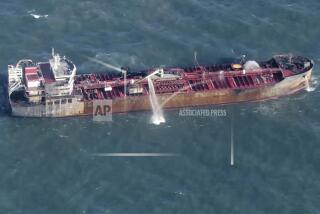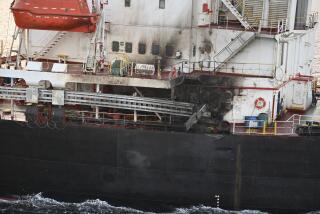EU Agrees to Ban on Tankers
- Share via
BRUSSELS — European Union nations agreed Friday to ban single-hull tankers carrying heavy fuel oil in their waters, in an effort to prevent disasters like the devastating oil spill off the coast of Spain last month.
The ban will come into force in January as part of a package of measures rushed through by EU transport ministers after the Prestige oil tanker cracked, spilling millions of gallons of fuel oil onto Spain’s beaches. It then broke into two pieces and sank.
“We want to avoid these ecological bombs being able to sail in our waters,” EU Transport Commissioner Loyola de Palacio of Spain said.
In addition to heavy fuel oil, the immediate ban covers single-hull carriers of tar, bitumen and heavy crude. The 15 EU nations also plan a total ban on single-hull vessels more than 15 years old. That ban is likely to come into force in 2010, De Palacio said.
In addition, the EU plans to set up “safety zones” aimed at keeping out dangerous ships and to introduce a $1-billion fund to help areas stricken by oil slicks.
The EU also declared its ports immediately off limits to 66 ships listed as particularly dangerous.
It is not known how effective that will be. A Spanish research institute, Home of the Employed Foundation, said that more than 50 blacklisted cargo ships had entered Spanish ports over the previous 10 days despite pledges to keep them out.
De Palacio brushed aside fears from the Netherlands that the ban on single-hull vessels could jeopardize fuel supplies, saying 50% of tankers worldwide already have double hulls and that the percentage is growing.
The International Assn. of Independent Tanker Owners said the ban would distort shipping markets but would not cause widespread disruption, as any shortfall would be made up by modern double-hull vessels.
The Prestige spill has tarred about 180 beaches on Spain’s coast. It also threatens the Portuguese and French coastlines.
More to Read
Sign up for Essential California
The most important California stories and recommendations in your inbox every morning.
You may occasionally receive promotional content from the Los Angeles Times.












